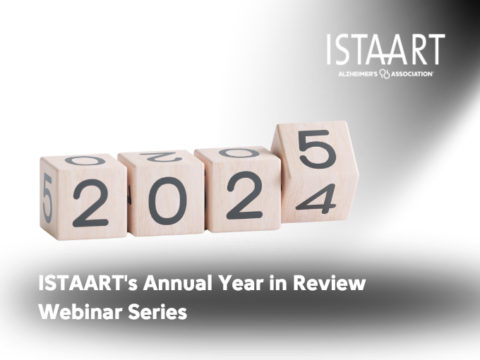It is that time of the year when ISTAART organises their Year in Review seminars for each of the Professional Interest Areas (PIAs). The first one of 2024 was indeed a very early one taking place on the 4th of January, and it was the turn of the Biofluid Based Biomarkers PIA.
As a researcher in fluid biomarkers with the expertise in frontotemporal dementia, I was asked to prepare the main presentation, a challenging but very fun task of collecting and reading the most important papers published in the field in 2023.
For those who are not familiar with the Year in Review Seminars or how they work, they consist of 30 minutes presentation from an early career researcher covering the highlights of the field in the year in review, followed by a panel discussion from experts. This year, the seminar was organised by Ana Pereira and Yanaika Hok-A-Hin, the panel of experts was formed by Jeffrey Dage, Marta del Campo, Suzanne Schindler and Henrik Zetterberg, the session moderated by Yuetiva Robles and I, Aitana Sogorb-Esteve, was the presenter.
The topics to discuss are often chosen by the presenter with the help from survey responders. The survey aims to identify which are the most important topics that have come up in the year, as well as the key publications regarding those topics.
For the year 2023, the topics selected for the presentation and discussion were three main themes: proteomic studies, plasma biomarkers and seeding amplification assays for proteins such as alpha-synuclein and TDP-43, characteristic of Parkinson’s Disease and frontotemporal dementia.
Our panel agreed to define 2023 as the ‘era of proteomics’. There were over 500 research articles were published in the field of proteomics in dementia, making it a hot topic! We have seen great advances in proteomic studies in cerebrospinal fluid not only for Alzheimer’s Disease but also for other type of dementias, as for example the paper published by Marta del Campo about Dementia with Lewy Bodies.
But we have also seen great highlights about cross-tissue proteomics as well as the so-called large-scale plasma proteomics (with a specific article in Alzforum) from where we have learnt the information we can obtain from comparing plasma with brain and CSF, as well as the key contribution of the use of panels of biomarkers, in combination with canonical biomarkers, instead of those canonical biomarkers alone.
Most of the discussion focused then on plasma biomarkers, 2023 has been the year of phosphorylated tau, especially p-tau217. There have been several studies evaluating the performance of plasma p-tau217 to predict tau and amyloid deposition and in the TRAILBLAZER-ALZ 2 trial for donanemab plasma p-tau217 was used as exploratory outcome measure, showing decreased levels with the drug administration. The discussion nonetheless focused more on the implementation of blood tests in clinical practices, with the point made by the panellists about the expenses of the tests available right now and how the effort to implement those in the clinical practices around the world would indeed decrease those expenses. It is very important as well to keep in mind the expertise of the GP to evaluate and interpret the results from such blood test and the importance of looking and those results in the context of each patient. It seems that for a full implementation of blood test in GP practices there is still a need of either further training for the GPs or specialized clinics for that.
Another important point regarding the blood tests is the need of having a real-world picture of their performance, and this was indeed a point some of the panellists highlighted as the main development they would like to see in 2024: big studies about real-world implementation of blood biomarkers for dementia as well as information on diverse populations.
Finally, the eyes are set on fingerpick and remote testing for 2024. This will be something to look for in the next year in the field of blood-based biomarkers, in which some developments in extraction techniques, preanalytical parameters and the implementation of new more sensitive technologies to measure biomarkers will make a big step.
The last pending subject from 2023 was the studies of fluid biomarkers in non-AD dementias, looking at protein deposition assays such as alpha-synuclein and TDP-43 seeding assays but also to proteomic studies in these types of pathologies. The advancements on the technologies, sensitivity, and big cohorts, as well as the use of extracellular vesicles will be as well an important highlight that the panellists anticipated to happen in 2024.
So overall, researchers in the biofluid based biomarkers field are looking forward the excitements that 2024 will bring. We will expect to see many more proteomic studies in CSF, plasma but other biofluids and especially in other non-AD dementias, resulting in panels of proteins that could help with the differential diagnosis of dementias.
The field is also looking forward results of high performing blood tests in real-world assets and diverse populations that could be key not only for early diagnosis but also to better understand and monitor the clinical trials taking place.
We will keep a close look at the advancements in remote testing and the fingerpick devices and tests being developed and validated as we speak.
And finally, we will expect exciting results from the field of extracellular vesicles and the development of assays to detect pathogenic forms of proteins such as alpha-synuclein and TDP-43 to detect non-AD pathologies.
2024 looks like it will be an exciting year for the field of biofluid based biomarkers!
To join ISTAART and the Biofluid-based biomarkers PIA visit: https://istaart.alz.org/home

Dr Aitana Sogorb-Esteve
Author
Dr Aitana Sogorb-Esteve is a Race Against Dementia Research Fellow based in the Dementia Research Centre at University College London. Sitana works on the fluid biomarker team of Dr. Jonathan Rohrer group. Her work focusses on finding novel fluid biomarkers to assess cellular dysfunction in genetic FTD. She is particulary looking for fluid biomarkers of synaptic dysfunction in genetic FTD, aiming to develop a technique for measuring these synaptic markers in blood.

 Print This Post
Print This Post






